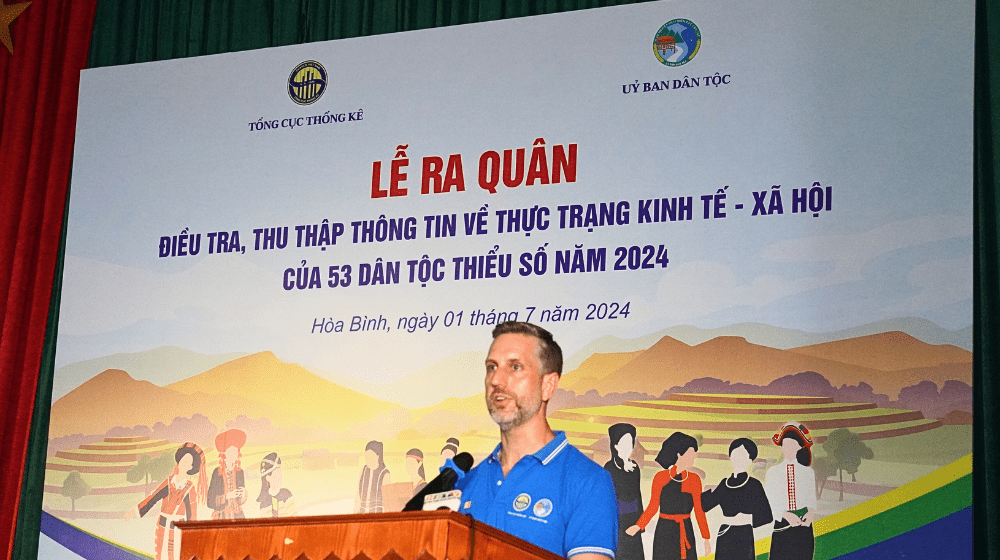- Mr Hầu A Lềnh, Minister of Committee for Ethnic Minority Affairs;
- Mr Trần Quốc Phương, Vice Minister of Planning and Investment;
- Madame Nguyen Thi Huong, Director General of the General Statistics Office;
- Mr Đinh Công Sứ, Vice Chairperson of Provincial People’s Committee, Hoa Binh province;
- Distinguished guests;
- Local media
Just three months ago, with Madam Nguyễn Thị Hương, Director General of the General Statistics Office, we launched the 2024 Intercensal Population and Housing Survey in Ha Noi. Today, we embark on another significant survey: this time on the socio-economic status of 53 ethnic minorities in Viet Nam.
I congratulate the Ministry of Planning and Investment and the Committee of the Ethnic Minority Affairs for your joint efforts to conduct this survey.
UNFPA Viet Nam is proud to partner with the Government of Viet Nam in improving data collection and analysis, and building reliable and inclusive data systems that enable evidence-based planning and monitoring.
Reliable, inclusive data that is disaggregated by gender, ethnicity, location and other key factors is essential to leave no one behind. Not least as, at the global level, improvements in data collection tell us that the most marginalise populations are largely excluded from development progress.
Data on the situation of ethnic minority communities or data disaggregated by ethnicity help policy makers to ensure that policies work for minoritised or marginalised people who are at high risk of being left behind.
In late April, I visited Mu Sang commune, Phong Tho district in the mountainous province of Lai Chau, which is home to 20 different ethnic minority groups, accounting for 80% of the province’s total population. During the visit, I heard stories from local people. I was told:
- I didn’t go to the local health facility because it is very far from my house and I didn’t have money to pay for transportation. Even if I could pay for it, there is no vehicle.
- I didn’t go to the health facility because it’s our custom not to give birth in front of strangers.
- I had to go to the district town to have the ultrasound check. It’s costly but we had no other option. Ultrasound is not available at the communal health centre.
I also attended a session in which two village-based birth attendants provided local ethnic minorities with information and knowledge about maternal and child health care including nutrition and advice on attending antenatal check-ups and giving birth in a health facility. Life-saving information.
This visit prompted me to ask how can we improve the health and well-being of ethnic minority groups living in different parts of the country? What can we do to end preventable maternal deaths? And how can we best deliver sexual and reproductive health information and services?
Answering these questions contributes to achieving the sustainable development goals related to good health and the fulfilment of rights and choices for all. Yet these questions cannot be addressed without data. Reliable, inclusive and disaggregated data inform policy decisions and helps tailor effective solutions to reach and respond to the needs of those who are at high risk of being left the furthest behind.
Findings of the 2024 Ethnic Minority Survey will help to identify disparities among different ethnic communities, especially regarding access to basic services, employment and living standards. These are critical to monitor progress against the government’s policies as well as inform and actions to reduce vulnerabilities facing ethnic minority groups.
Dear participants,
UNFPA’s 2024 State of World Population Report underlines the need for reliable, inclusive, culturally relevant and internationally comparable data. UNFPA’s report calls for data disaggregated by gender, ethnicity and other factors as an important part of the ICPD Programme of Action which acted as a catalyst for investment in improving data collection and analysis including the application of digital technology in many countries around the world.
The Report also points out that many people and communities are uncounted and unaccounted for. Data collection often overlooks the needs of stateless persons, HIV status, LGBTQIA+ identity, internally displaced people and people living in detention. Too often, data reduces people to simple statistics, reinforcing stereotypes and fuelling biases and stigma.
UNFPA calls of all countries and societies worldwide to prioritise investments in population data systems, making data collection safe for all people, and working with marginalised communities to ensure they are represented. It is only by counting people as they are, in all their diversity that we will be able to combat prejudice and inequality and to create a more resilient, peaceful and prosperous future for all.
UNFPA is happy to see Viet Nam’s steps to champion data collection and we remain committed to continuing our technical support to the government of Viet Nam and the General Statistics Office to produce and maximise the use of quality data for accelerating social justice and sustainable development in Viet Nam.
I look forward to seeing the successful results of the Ethnic Minority Survey./.


